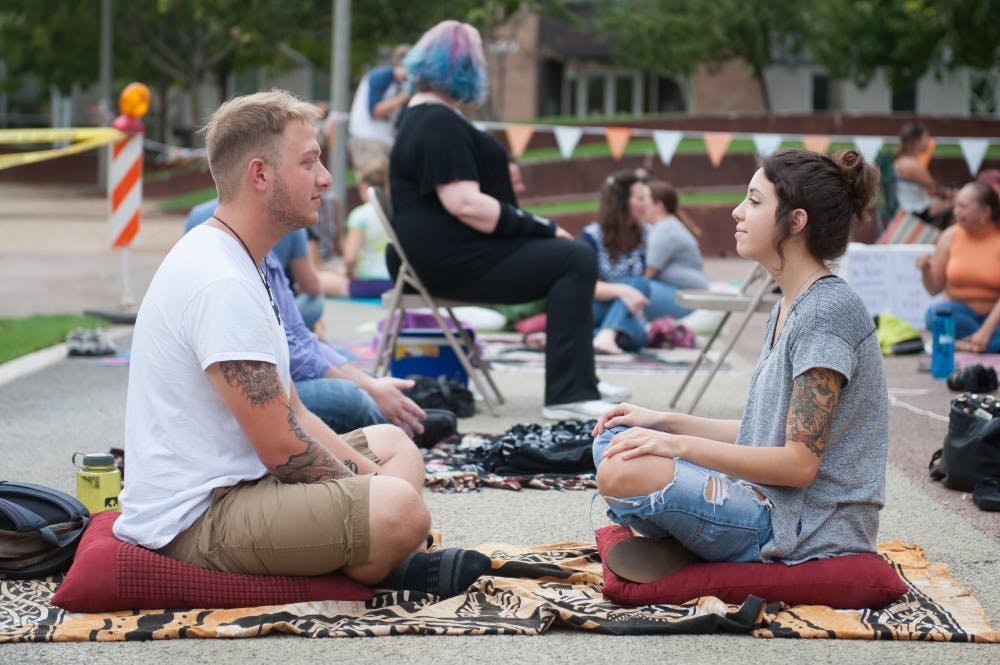Settling on patterned blankets, cushions and chairs, hundreds gathered in Civic Space Park gazing into each others' eyes. Each came with their own background, but all of them sought the same thing — a human connection.
The idea behind the World’s Biggest Eye Contact Experiment was simple. In 140 cities around the world, people sat down face-to-face with their community members and looked into each others eyes for 60 seconds on Tuesday.
Yet the idea went far beyond simply looking at someone and moved into the concept of restoring human connection in a world wrapped up in technology and isolated lifestyles.
That was what organizer Cynthia Djengue set out to do when she decided to bring the project to Phoenix.
“All of us are looking at our phones, we’re really busy, more than we ever have been, we don’t take the time out to pay attention to each other,” Djengue said.
Djengue, a long-time social worker, delved into the experiment after she saw a deep disconnect and air of depression in the elderly community she worked with.
“They have a lot of grief, they’re experiencing and maybe their wife or husband is dying so they don’t have that person and that sense of loss,” she said.
Large group gathered in Phoenix, but the experiment has 140 different cities in the world participating-@statepress pic.twitter.com/urTYBBgGVA
— Megan Janetsky (@meganjanetsky) October 15, 2015
When she saw the project announced online, she saw a parallel between that deep disconnect and alienation she saw in the community she worked with and what the project was trying to combat.
She decided to announce the event on Facebook and the response was immediate. More than 500 people RSVP'd to the event and over 3,500 people shared it.
And as members of the community gathered to join them on their multicolored cushions and blankets, it was clear that she wasn’t the only one who hoped to rebuild this sense of humanity in her community.
“If you’re willing to open up in that moment and be vulnerable, it can change your life forever, especially if you don’t connect with people regularly,” said Ann Cabano, one of the participants and friend of Djengue.
For many of the participants, the project wasn’t about connection, but also about vulnerability.
ASU alumna Kaitlyn Bezuyen stood on the sidelines with a pillow firmly clasped under her arm. She was one of many who was mustering up the courage to open herself up to another person for more than a moment.
“I came here to see how scary it would actually be, and I didn’t think I’d feel so vulnerable or scared at first, and now that I’m standing here it’s crazy to see these people have this connection," Bezuyen said.
While it may sound like a strange and 1960s-Woodstock sort of experience, for Bezuyen 60 seconds of eye contact can be one of the most intense and vulnerable experience for them in years.
David Sederoff was less of a sideliner. One of the first people to arrive at the event, Sederoff sat confidently and contently on his blanket, his legs crossed and tattooed arms splayed by his side.
"I feel like we have a connection. The connection I feel with these people, I feel it’s as if I’ve known them for more than that one minute and it’d be nice to see them again and be like ‘I know who you are,’" Sederoff said.
However, Djengue said each participant brings with them their own set of experiences and baggage, the key was, she said while grasping her community member’s arm, to let all that melt away and open yourself up to the person before you.
"It’s about paying attention to our surroundings and other human beings,” said Djengue.
Related Links:
Culture Undiscovered: Creating New Communities in Civic Space Park
World's biggest eye contact experiment peers into Downtown Phoenix
Reach the reporter at megan.janetsky@asu.edu or follow @meganjanetsky on Twitter.
Like The State Press on Facebook and follow @statepress on Twitter.




